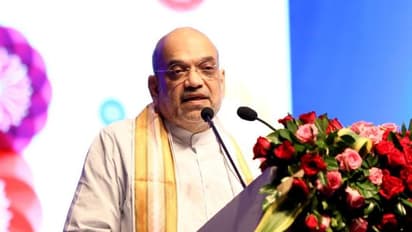Amit Shah at G20: 'Terrorists may exploit Metaverse; Hawala to Crypto Currency shift a concern'

Synopsis
"No single country or organization can combat cyber threats alone; we need to think by rising above conventional geographic borders and it requires a united front," said Union Minister Amit Shah while taking part in the inaugural session G-20 Conference on Crime and Security in the Age of NFTs, AI and the Metaverse
Union Home Minister Amit Shah on Thursday stressed the 'need to strengthen the capabilities of nations and international organizations to deal with new and emerging, traditional and non-traditional challenges, including terrorism, terror financing, radicalization, narco, narco-terror links, and misinformation in a better way'.
Taking part in the inaugural session G-20 Conference on Crime and Security in the Age of NFTs, AI and the Metaverse, in Gurugram, Haryana, the Union Home Minister emphasized the increasing threat posed by cybercrimes such as ransomware, phishing, online scams, online child sexual abuse, and hacking worldwide. He expressed concerns that these cybercrimes may multiply in the future, necessitating a proactive and collaborative response to emerging threats in areas like NFTs, AI, Metaverse, and other emerging technologies.
Acknowledging the digital age's significance, the minister stressed that cyber security has become a vital component of global security, requiring attention to its economic and geopolitical implications. He underscored the need to strengthen the capabilities of nations and international organizations in combating both traditional and non-traditional challenges, including terrorism, terror financing, radicalization, narco-terrorism links, and misinformation.
The minister expressed worry about the transformation of security challenges, such as the shift from "Dynamite to Metaverse" and the conversion from "Hawala to Cryptocurrency," which demands a collective strategy to address these concerns. He highlighted the use of virtual assets by terrorists for financial transactions, their exploitation of the dark web to hide identities and disseminate radical material, and the need to understand and counter these activities.
Additionally, the minister raised concerns about the potential exploitation of the Metaverse by terrorist organizations for propaganda, recruitment, and training. He highlighted the risk of deep-fakes and identity theft facilitated by the Metaverse and better biometric information. Furthermore, the minister noted the range of cybercriminal activities, from ransomware attacks and the sale of personal data to online harassment, child abuse, and misinformation campaigns, emphasizing the impact on national security, law and order, and the economy.
Given the borderless nature of cybercrimes, the minister stressed the importance of establishing response mechanisms under different countries' laws and fostering global cooperation to harmonize cyber security standards, best practices, and regulations. He expressed optimism that the conference would yield a concrete action plan in this regard.
The minister also drew attention to the widespread threat of cyber attacks faced by many countries, with major economies estimated to have incurred losses of approximately $5.2 trillion during 2019-2023 according to World Bank estimates. He highlighted the complications introduced by the use of cryptocurrency by malicious actors, further necessitating detection and prevention measures. The Union Home Minister minister emphasized the critical need for international collaboration, response mechanisms, and harmonization of cyber security efforts to effectively address the evolving challenges posed by cybercrimes.
Stay updated with the Breaking News Today and Latest News from across India and around the world. Get real-time updates, in-depth analysis, and comprehensive coverage of India News, World News, Indian Defence News, Kerala News, and Karnataka News. From politics to current affairs, follow every major story as it unfolds. Get real-time updates from IMD on major cities weather forecasts, including Rain alerts, Cyclone warnings, and temperature trends. Download the Asianet News Official App from the Android Play Store and iPhone App Store for accurate and timely news updates anytime, anywhere.